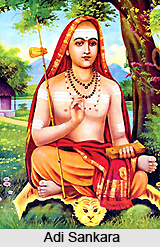 The affluent thinker, Sankara was born in a Namboodri family at Kaladi in Kerala. According to tradition he took sanyasa at the tender age of eight. He soon joined a Vedic school on the banks of the holy Narmada where his teacher was Govindapada, chief disciple of Gaudapada. After completing his studies, Sankara went to Kasi to meet scholars and discuss his interpretations of the Upanishads.
The affluent thinker, Sankara was born in a Namboodri family at Kaladi in Kerala. According to tradition he took sanyasa at the tender age of eight. He soon joined a Vedic school on the banks of the holy Narmada where his teacher was Govindapada, chief disciple of Gaudapada. After completing his studies, Sankara went to Kasi to meet scholars and discuss his interpretations of the Upanishads.
Adi Sankara spent the rest of his life in advocating his Advaita philosophy; for this, he wandered all over the country meeting many opponents and refuting their arguments.
He founded the four mathas in the four corners of India, Sringeri in Mysore, Puri in Orissa, Dwaraka in Gujarat, Badrinath in the Himalayas and lastly the Sarvajnapita at Kanchipuram. He is believed to have left this earthly abode at the age of thirty-two.
Sankara`s religious morals deeply influenced India. Every Hindu felt the impact of his teachings in one-way or the other.His teacher moulded in thought in the minds of thousands of Indian. He strictly adhered to the tenets of the Upanishads. In his commentaries on the Brahmasutras, Upanishads and the Bhagavad Gita he was the first to find a unified system of thought in these teaching, which was Advaita. The two truths Ahum Bmhmasmi and Tattvnmasi pervade all his teachings. The Brahman is Satchitananda.
The individual soul though one with the Brahman is covered by the maya of ignorance. When ignorance is removed, knowledge arises and the soul becomes aware of what it is. One of his famous poems is Soundarya Lahari, which is in hundred verses in praise of Goddess Parvati. Sankara with his lofty ideals on Vedanta thus put Hinduism with a firm background.



















